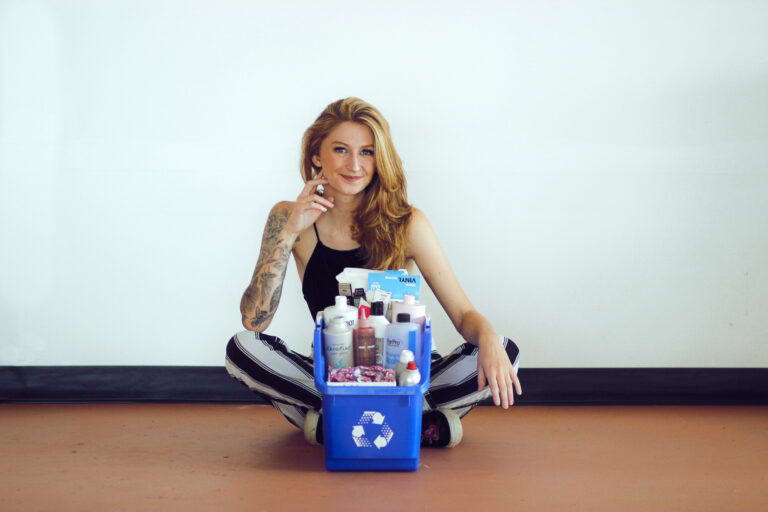
- Kim Kisner
- Business
- 01/30/2024
Hannah Craik Seeks to Make a Difference with Salonvironment

The beauty industry’s net worth is estimated at $646 billion, yet cosmetologist Hannah Craik saw a gaping hole in terms of education and resources available regarding sustainability. So, she turned that into an opportunity to create Salonvironment and help the creation of Green Beauty Community.
SBN Detroit interviewed Craik about the work she’s doing in Southeast Michigan to help salons and stylists become more sustainable.
Q: Share with us your background that ultimately led you to develop Salonvironment?
A: I was a cosmetologist for ten years and worked behind the chair for seven. When the pandemic hit, I was going through some life changes and took some time to reflect on what truly makes me happy and what I want to do. I believe I was put on earth to serve others. At that time the wildfires in California were so alarming, I started thinking that I needed to do more.
The beauty industry has a large impact on the environment, yet it lacks education and resources around sustainability. So everything clicked.
Q: What is the impetus behind Salonvironment?
A: I love the beauty industry. I also love the outdoors, hiking, and nature. So I thought, why not combine the two? I think beauty professionals are superheroes, and as I said, there is not much support within the industry for developing sustainability practices.

So three years ago I started Salonvironment and I’ve never felt more connected to myself, my community, and the world. This is a way I can make an impact.
Q: You focus on recycling, alternative products, salon efficiency, and green marketing. How does that translate in your services?
A: To address recycling, we look at what waste salons have, and what products they use and connect them to local recycling programs. I also consult with clients on how to stay organized and not get overwhelmed when it comes to recycling.
Regarding products, there are several brands now that have launched vegan or cruelty-free products. Also switching to nonplastic tools like bamboo is an option as is purchasing higher-quality tools that will last longer so as not to contribute to landfills.
Salon efficiency deals with running the business with sustainability in mind. One thing a salon can do is switch from selling products in the studio to selling them online, decreasing the risk of expired inventory that heads to landfills.
And when it comes to marketing, salons should highlight their green efforts. Also creating partnerships with other businesses that incorporate sustainability practices is good exposure.
Q: What is your approach and process when consulting with a salon or stylist?
A: We start where the client is and work together to build realistic habits. It’s so easy to get overwhelmed, but I break it down into bite-sized pieces and start simple.

As an example, salons utilize a lot of energy, water, etc. They can easily switch to LED lights, use more electrical strips, and switch to sink heads that conserve water.
Then there are longer-term investments. We can look at their plumbing infrastructure, solar panels, and even the color of their roof. We can also help consult on grants available.
Q: Who are some of your clients in Southeast Michigan?
A: I work with many. One is Kismet Studio in Farmington Hills. I’ve also partnered with Mint Hair Crafting in Ferndale, and I’ve worked with Salon and Co. with locations in Shelby Township and West Bloomfield. I also work with some salons that are out of state.
Q: What are the biggest hurdles in the salon environment when it comes to sustainability?
A: Lack of support. You have to figure a lot of it out yourself. This is a $6 billion global industry yet there is a lack of regulations, policies, and education.
There are a lot of people who want to make a difference. They just need help and support.
I helped launch the Green Beauty Community in May 2022 with Daniel Johnson, Mazey Heydman, and Jacquelyn Rodriguez. It offers free education and connects like-minded individuals to create a bigger conversation for change in the industry. Tapping into this community is a great way for stylists and salon owners to address the challenges they face.
Q: What is the question you get asked most about sustainability from stylists?

A: “Where do I start?”
I also get a lot of questions on the best ways to recycle, since that’s how I started.
There is also confusion about how to get grant money for sustainability programs.
Q: How can stylists assist their clientele to become more eco-friendly?
A: Starting the conversation and leading by example are the most important things. People don’t know what to do or how to start until they are presented with solutions. People learn best by example and from others. So I think stylists should explain why they are making these changes (like recycling and why it’s good for the community, what products clients can use, etc.) Clients will typically follow suit.
Q: How can people get involved?
A: Check out Salonvironment.com. Join the Green Beauty Community. Talk about sustainability within the beauty industry to others. Spread the word and the resources.
The beauty industry is enormous, which means we can make a big impact. That’s so inspiring to me and to many others.
Be sure to subscribe to our newsletter for regular updates on sustainable business practices in and around Detroit.
Kim Kisner
- All
- Business
- Community
- Education
- Events

ZF Group, a global technology company with its North American headquarters in Northville, specializes in systems for passenger cars, commercial vehicles, and industrial technology. With a focus on next-generation mobility, the company develops solutions that address electrification, automation, and digitalization while aiming to improve safety, efficiency, and sustainability in transportation. SBN Detroit interviewed Anuj Shah, Sustainability Lead, for the Americas, to explore the most pressing environmental challenges in...

The Chip Bag Project, based in Detroit, is a sustainability initiative that upcycles hard-to-recycle snack packaging — particularly chip bags — into insulated sleeping bags for individuals experiencing homelessness. Founded by Eradajere Oleita, the project addresses both environmental waste and housing insecurity by transforming materials like Mylar into practical, thermally efficient solutions. In June, Oleita was among Trelllis’s 30 Under 30, its annual recognition of the brightest young...

PowerPanel, headquartered in Oxford, focuses on sustainable energy technology with a particular emphasis on hot water systems and thermal energy capture. The company designs and manufactures modular solar hybrid systems that integrate both photovoltaic and thermal components into a single unit. Its goal is to offer energy solutions that are more efficient, durable, and economically viable for a range of commercial and industrial applications. SBN Detroit interviewed Garth...







